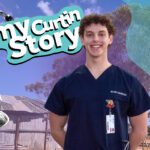When COVID hit, Cheryl’s research project had to take a 180° turn. After being locked out of WA and going back to the drawing board, Cheryl still managed to complete her ground-breaking research project within three years – all with the support of her supervisors, Marylène and John, over Microsoft Teams.
Dr Cheryl Sykes recently completed a PhD at Curtin’s Future of Work Institute (FOWI), co-supervised by Curtin’s Professor Marylène Gagné and Professor John Phillimore. Cheryl and Marylène reflect on completing a PhD remotely during COVID, how it impacted their supervisory relationship and the privilege of doing research they hope will make an impact on employment services in Australia.
Cheryl
I began my PhD at a local university on the East Coast. While I was happy with my supervisory team, I needed to access somebody who could give me guidance with the theoretical part of it. As it turned out, the self-determination theory community was coming together in the Netherlands in 2019; self-determination theory is the concept that all humans have three basic psychological needs – autonomy, competence and relatedness – that underlie growth and development. I decided I would go to the conference and (as I joked to Marylène), I stalked her and a list of four other Australian academics who were self-determination theory gurus.
Marylène was interested instantly in the topic, and once I understood the way that supervision works, I enrolled at Curtin and that’s how we came together.
My PhD was originally designed to examine the factors that influence how employment consultants motivate jobseekers, and whether a professional development workshop could change motivating styles to be more need supportive. But due to COVID, the study was re-designed to instead examine the mental health and motivational impacts of social and technological systems on unemployed individuals.
COVID was the biggest challenge, really. I live on the Sunshine Coast in Queensland, so I couldn’t get into WA. I basically did the whole PhD remotely. My Milestone 1 was a completely different project to what I ended up doing. I came over in February 2020, did my Milestone 1 presentation, and then lockdown came. Without having Teams and the internet, I can’t even imagine how we would have managed.
Initially, my research project was about running a training program and measuring how that would go in the employment services sector. But of course, when everything locked down, employment services providers ended up with triple the number of clients. There’s no way in the world they were going to entertain doing a training program. I had to go completely back to square one and start the whole process again.
I would call myself a bit of a problem finder, a gap spotter. I could see both the business and social problem.
In the recent Royal Commission, we all became aware of the devastation caused by the false accusations of financial wrongdoing levelled at many unemployed people. It’s a reminder that the design – and delivery – of public policy matters because it affects real people’s lives.
The results of my research echo the impacts of policy on unemployed people, finding that mandatory engagement in the employment services system – the part of the system meant to help unemployed people find sustainable jobs – was more likely to adversely affect their mental health when they felt they didn’t receive the practical help they needed, and that nobody really cared about them.
My study had both quantitative and qualitative analysis, which I think is a lot of what had been missing in the previous work. The government is currently doing a review into the system and my work forms part of that body of work that is being submitted.
One of my reviewers is a real quantitative analysis guy in self-determination theory and his comments were: ‘You did a good job of the quantitative analysis, but it was those stories – I really felt them.’ There’s been a couple of times where I felt that what people read, they came back and said, ‘Wow, I’ve never thought about it like that.’
While it is easy to blame service delivery providers, there’s a real need to address the assumptions built into the policy that underpins the system – because whether a person does or does not find a job, the guiding principle of our social support system must be to do no harm.
That’s the highlight of being able to write something where people can say, ‘That’s changed my mind or it’s changed my thinking a little bit on the topic.’ The numbers don’t always tell the story, but these people wrote quite extensive stories about what was going on. It was a privilege to record them.
Marylène:
What really made me excited about this PhD project was that Cheryl was coming into it with a deep knowledge of the system. So, there’s really a policy element to the project. It really hooked me from the beginning because it was already a well-defined project that could be quite impactful.
One of the highlights for me was the engagement of those who participated in the project; the unemployed people who told us so much about their lives. They put in so much detail, they shared so much. It was really heart-wrenching to read, but I felt so grateful to them for sharing those things with us because it gave us such a vivid picture of what it’s like to be unemployed and having to deal with employment services in Australia. It just made it all come alive. Hopefully it will come through in the submissions that Cheryl does and all the work that’s going to come after now, and the thesis will lobby for change.
I was very privileged with Cheryl because she’s super organised and diligent. She was for the first time dealing with a big data set and she learned very advanced statistical skills to be able to analyse the data, both qualitative and quantitative. The amount of work and learning that she had to do to pull this off was huge, so I really admire her for that.
In terms of supervising in general, I really enjoy it because for me it’s about people who come in and want to do a very specific project. Oftentimes what I see is that they’ve had personal experiences or professional experiences within the topic area and helping them to achieve that, for me, is very satisfying. I only take on students whose topics I also feel excited about. Otherwise, I know that I’m not going to put the energy into it. I need to have that intrinsic motivation.
I try to practice what I preach as much as I can. I don’t always succeed 100%, but it’s about being supportive. You want to nurture people’s motivation for what they’re doing, and that’s what I try to do. Give people lots of autonomy into what they’re doing and try to provide constructive feedback. Getting along is really important, so I try to nurture that as well and get to know them. You must always keep a professional relationship, but it doesn’t mean that you have to be cold and not care about what’s going on in a person’s life.
I really enjoy supervising because you see people discovering, building skills and getting excited about their stuff. That in itself is a reward for me.
I think supervising remotely for three years has made me a bit more structured in my approach. You have to make sure to keep track of what’s happening and keep in contact regularly and really make the effort to do that. When you’re in the same building, it kind of just happens, and you don’t really have to put as much effort into it. But when it’s remote like this, you have to organise it and make sure you’re there, you have to show up, you have to really dedicate that time.

Dr Cheryl Sykes
Cheryl Sykes is an experienced business professional. She holds an Executive Master of Business Administration, and has a background spanning diverse sectors including human services, retail, trades, training, adult education, logistics and distribution, franchising, and non-profits. Cheryl’s deep interest in analysing social and technological systems and identifying gaps and opportunities for improvement led her to pursue a PhD, which focused on examining the mental health and motivational impacts of mandatory employment services system on unemployed individuals. Currently, Cheryl works as a Digital Specialist, where she leverages her expertise in research, innovation, and process improvement to help small businesses to adopt technology and to become more resilient.

Professor Marylène Gagné
Marylène Gagné is a John Curtin Distinguished Professor at the Future of Work Institute in the Faculty of Business and Law. Marylène’s research examines how organisations, through their structures, cultures, rewards, tasks, and management, affect people’s motivational orientations towards their work, including volunteer work, and how quality of motivation influences performance and well-being in the workplace. She is a Fellow of the Academy of Social Sciences in Australia and of the Society for Industrial and Organizational Psychology. She is associate editor at the journal Motivation and Emotion and past associate editor at the European Journal of Work and Organisational Psychology.

Professor John Phillimore
John Phillimore joined Curtin in July 2007 as the Executive Director of The John Curtin Institute of Public Policy (JCIPP). In addition to leading the JCIPP, John is closely involved with three other research centres and institutes at Curtin University: National Centre for Student Equity in Higher Education (NCSEHE), where he is Director of Research; Future of Work Institute (FOWI), where he leads the public policy research theme; and Bankwest Curtin Economics Centre (BCEC), where he is a Professorial Fellow.



